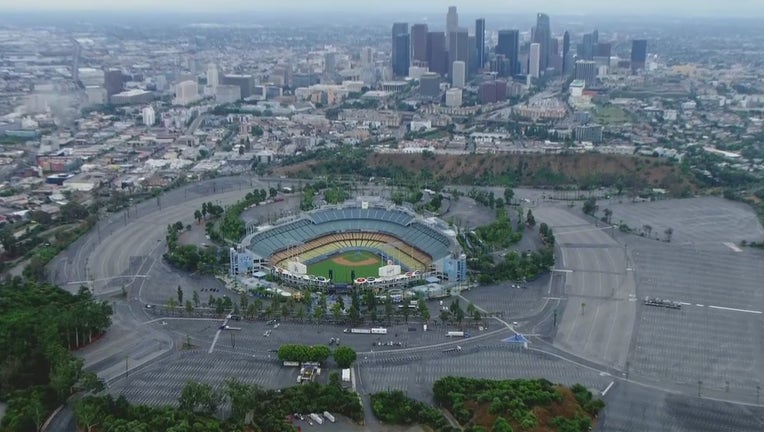California bill seeks to provide reparations for families displaced from land where Dodgers Stadium was built

Photo taken by SkyFOX of Dodger Stadium on Aug. 21, 2023, at 8 a.m. following Tropical Storm Hilary. (FOX 11)
LOS ANGELES - A California state lawmaker wants to provide reparations for displaced families in Los Angeles who lived in the area where the Dodgers Stadium currently stands.
In a press release, Assemblywoman Wendy Carrillo, D., announced she had introduced a bill, AB 1950, that "aims to address the historical injustice faced by those living in the Chavez Ravine in Los Angeles, a predominately Latino community."
Chavez Ravine was established in the early 1900s and named after Julian Chavez, a former rancher, assistant mayor, city council member, and L.A. County’s first supervisor in the mid-1800s. Spanning over 300 acres, the land area was "home to generations of predominantly Mexican Americans" in the 1950s. Chinese and Italian residents occupied the area as well.
Carrillo explained in the press release that Los Angeles officials acquired the land through eminent domain to build public housing on Chavez Ravine in the 1950s, which displaced thousands. However, city officials later abandoned the project and sold the land to a private developer who built Dodgers Stadium there, which opened in 1962.
"Families were promised a return to better housing, but instead, they were left destitute," Carrillo said.
SUGGESTED: Jackie Robinson’s legacy looms over All-Star Game in LA
Carrillo explained in the press release that Los Angeles officials acquired the land through eminent domain to build public housing on Chavez Ravine in the 1950s, which displaced thousands. However, city officials later abandoned the project and sold the land to a private developer who built Dodgers Stadium there, which opened in 1962.
"Families were promised a return to better housing, but instead, they were left destitute," Carrillo said.
"This is the first step of bringing justice to the people of Palo Verde, La Loma and Bishop, wrongfully known as Chavez Ravine," Melissa Arechiga, the co-founder of the organization, said at a news conference accompanied by Carillo.
The press release states the bill seeks to "acknowledge and rectify the displacement of these communities in the 1950s, offering a path toward historical accountability, reparative measures, and a permanent memorial honoring their legacy."
"For generations, Chavez Ravine stood as a beacon of hope and resilience, embodying the dreams and aspirations of families who built their lives within its embrace. With this legislation, we are addressing the past, giving voice to this injustice, acknowledging the pain of those displaced, offering reparative measures, and ensuring that we honor and remember the legacy of the Chavez Ravine community," Carrillo said.
Carrillo's bill is the latest example of reparations being introduced in state legislatures. Municipalities and states across the country have also recently launched exploratory efforts on the matter. Reparations are even being considered on the federal level.
Reparations have also been proposed or expected to be implemented in other cities in California; Fulton County, Georgia; Shelby County, Tennessee; Boston; Detroit; St. Paul, Minnesota; and Durham, North Carolina.

